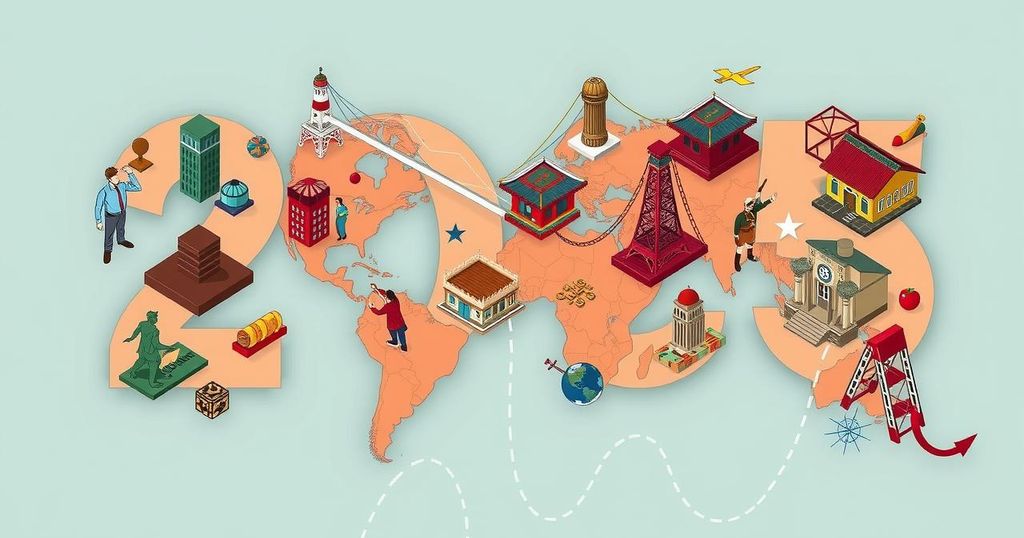In 2025, global concerns over inflation, AI-related job losses, climate change, and immigration persist, yet optimism is gradually growing. A survey reveals that 71% of respondents expect improvements, despite ongoing challenges. Significant worries include rising prices and job security, particularly among Latino communities and citizens in Latin America, who echo global trends. Public sentiment remains cautious as expectations surrounding immigration and environmental issues highlight the complexities facing nations today.
As we approach 2025, significant concerns endure regarding inflation, job displacement attributed to artificial intelligence, climate change, and immigration. Nevertheless, there is a cautious sense of optimism among global populations. A recent survey conducted in 33 countries indicates that 71% of respondents hold a belief that 2025 will bring improvements compared to the previous year, marking a slight increase from the previous year’s sentiment. This evolving outlook reveals the complex nature of economic and societal dynamics shaping people’s perceptions today.
The findings from a survey comprising 23,721 adults, collected between October 25 and November 8, illustrate a nuanced change in public sentiment. Despite the ongoing cost-of-living challenges and global conflicts, there is a notable decrease in the number of individuals characterizing 2024 as unfavorable. Only 51% of respondents reported it being a bad year for their families, a drop from 53% in 2023. Likewise, perceptions of 2024 as a detrimental year for the nation decreased from 70% to 65%. Such statistics reflect resilience and a cautious hope for more favorable circumstances ahead.
Specific concerns about inflation continue to dominate discussions, with 79% of survey participants anticipating that price increases will outpace income growth in 2025—a trend persisting since 2022. Furthermore, 74% expect tax hikes due to ongoing financial pressures. Interestingly, expectations regarding rising interest rates have diminished, indicating a growing belief that central banks may relax their policies of monetary tightening. Amidst these economic narratives, the Latino community in the United States expresses particular worries about rising costs and job security, with 65% fearing job losses from AI, though 43% acknowledge the potential for technology to generate new opportunities.
In Latin America, economic concerns resonate similarly, with inflation and unemployment emerging as pressing issues for citizens. Countries such as Brazil, Mexico, and Argentina continue to contend with these challenges, yet respondents show guarded optimism regarding potential economic stabilization in the future.
Further complicating matters, immigration remains a contentious topic worldwide. An anticipated 67% of individuals expect an increase in immigration to their countries in 2025, which reflects a slight decline from previous years. While countries like Turkey and Spain anticipate higher immigration rates, perceptions in America and Canada remain distinctively lower, highlighting the influence of societal anxieties and political rhetoric over tangible migration trends.
Additionally, the risks associated with technological advancements remain a critical area of concern. Although fears of job losses due to AI are prevalent, there are hopeful expectations for innovation, especially in sectors such as healthcare and transportation.
Environmental consciousness remains high, with 80% of survey respondents predicting an increase in global temperatures and 72% foreseeing more extreme weather occurrences. However, faith in governmental action to curb climate change appears to be waning, as evidenced by diminishing expectations for stricter carbon emissions regulations.
Overall, the complexities of global economic trends, immigration debates, technological advancements, and environmental challenges continue to shape public outlooks as we move into 2025. The subtle shift from pessimism to cautious optimism underscores the resilience of populations facing such varied pressures.
The landscape for 2025 is marked by persistent anxiety surrounding inflation, job losses associated with technological advancements, climate change effects, and immigration dynamics. These concerns have prompted a broader investigation into how people across various nations perceive their futures. The overall outlook remains multifaceted, capturing both apprehensions and a glimmer of optimism for improvement, reflecting a global conversation rooted in economic stability, societal challenges, and emerging technologies.
As we approach 2025, the intertwined issues of inflation, AI impacts on employment, climate change, and immigration are shaping public sentiment on a global scale. A notable, albeit modest, optimism emerges as many anticipate the coming year to yield improvements. However, significant challenges persist, highlighting the need for ongoing resilience and adaptability amidst economic pressures and societal changes.
Original Source: www.latintimes.com






